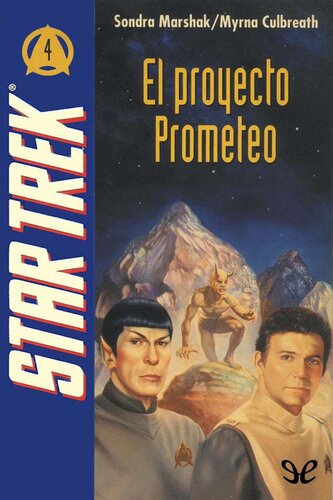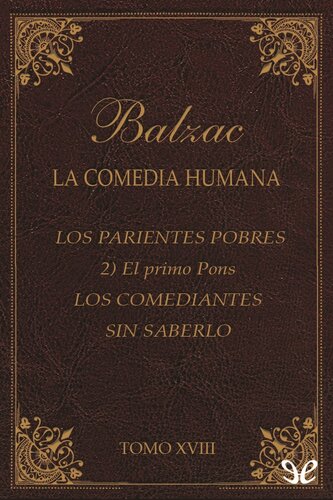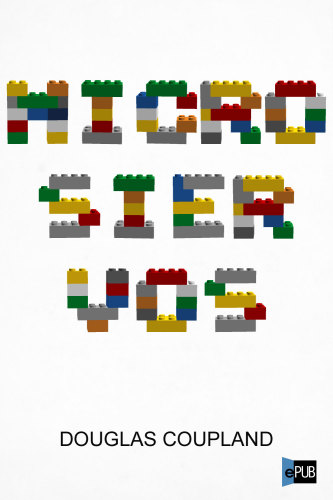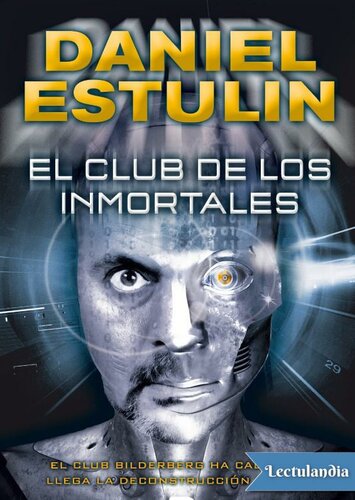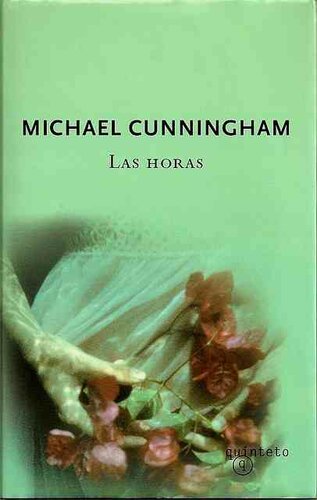oleebook.com
Tiempo de incertidumbre de Tobias Hürter
de Tobias Hürter - Género: Ficcion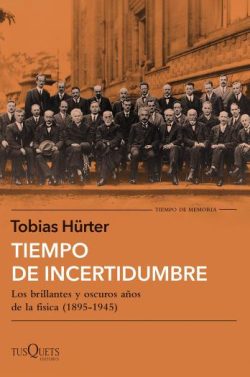
Sinopsis
La historia de una pléyade de mentes privilegiadas que a comienzos del siglo xx cambiaron para siempre nuestra comprensión de la realidad. Este libro cuenta la fascinante historia de cómo un grupo de auténticos genios de la física (Marie Curie, Werner Heisenberg, Erwin Schrödinger, James Clerk Maxwell, Albert Einstein, Max Planck o Niels Bohr entre otros muchos) transformaron de forma definitiva nuestra visión del universo, desde las galaxias más lejanas a las partículas más ínfimas de la materia, y de cómo, de esa revolución científica, han surgido descubrimientos e invenciones que han cambiado nuestra vida cotidiana. El autor explica de forma magistral cómo un grupo de grandes científicos relacionaron la velocidad de la luz con la energía, descubrieron las sorprendentes propiedades de la radiación y describieron el misterioso comportamiento del mundo subatómico. De forma tan fascinante como esclarecedora, Tobias Hürter narra las convulsiones históricas de aquellos años, el entramado de avances científicos y la extraordinaria galería de sus protagonistas, en los que la inteligencia se mezclaba a menudo con la excentricidad, y la amistad con la rivalidad.
Libros Recomendados - Relacionados
Reseñas Varias sobre este libro
Never did I think I'd read a nonfiction book about physics and I would've laughed in your face if you'd told me I'd end up loving it but...this was so good??nonfiction39 s Brian CleggAuthor 214 books2,876
The standard version of the old saying 'You shouldn't judge a book by its cover' misses a final few words: 'but most people do.' And in the case of this book it's a shame - because the cover is pretty awful and really doesn't do the book justice. The feeling from the cover is that this is going to be the worthy, laboured tome of an academic - probably a touch amateurish in its writing style. In practice, it's a slick piece of popular science writing.
Tobias Hürter is apparently a well-known German science writer, here translated by David Shaw. This is a book in the peculiarly American style of pop science - extremely focused on narrative and giving details in the manner of a docu-drama - so, for instance, we read that 'a young man in a checked suit hurtles down the steep, narrow stairway from the second floor of the house at Kramgasse 49, along the cobbled streets and through the covered medieval arcades. In his hand, he clutches an envelope. Passersby may be astonished to notice his footwear: worn green slippers, embroidered with flowers. But the young man pays no need to their surprised glances.' It's an engaging view, in this case a peek into the life of a young Albert Einstein.
In 53 short chapters, Hürter hurtles through the lives and contributions of the big names in quantum physics from Curie and Planck to Dirac and Pauli. We get a good dose of biographical context (if anything too much) and an interesting interlacing of the different contributions. Unusually, and effectively, Hürter includes short one to two page chapters giving some historical context in the wider world. So one of these, for example, entitled 'A Painter Moves to Munich', tells of Hitler avoiding the draft in Austria shortly before the First World War by escaping to Germany. These contextual chapters are very effective in situating the scientific developments alongside the political developments in Europe that were very much the setting for the evolution of quantum physics.
I did find some aspects of the style a little wearing. The book is almost entirely written in the present tense, which makes it feel a bit tacky to me. Hürter sits at the shallow end of presenting the science - I a bit more meat on my popular science, but here we don't learn a huge amount about the detail, rather skimming the surface to move on to the next story. However, this is an interesting approach, particularly with the interlaced short historical chapters, giving an overview of a large chunk of the development of quantum physics. If you enjoy the somewhat breathless narrative style, it's definitely worth giving it a try.16 s Boudewijn746 141
In this field, almost everything is already discovered, and all that remains is to fill a few holes - Phillip von Jolly
When Max Planck decided to study physics at the university of Münich, his physics professor Philipp von Jolly advised him to study something else because "in this field, almost everything is already discovered, and all that remains is to fill a few holes." How wrong was he: much later, Planck would receive the Nobel Price for the discovery of energy quanta.
This little anecdote shows how unprepared physics was for the discovery of quantum mechanics and how a handful of scientists would open up a complete new and bizarrely strange world of atoms, electrons and quanta.
This story is not a story about physics, but a universal human story on how our knowledge about quantum mechanics grew and sometimes shrank. It is a story of scientists, set against the backdrop of the early 20th century, an age of uncertainty. Physicists Marie Curie, Max Planck, Wolfgang Pauli, Niels Bohr, Werner Heisenberg, Ernst Schrödinger, Albert Einstein, and many others of which perhaps there may never be another era of science in which many of the most important physicists ever lived.
Tobias Hürter takes us back to these uniquely and often harrowing times where scientists were often overcome by doubt and how war and revolution upended their lives. It was interesting to read the lives of these scientists as friends and enemies, lovers and loners and indeed, men (and women) just us. He has created a lively description - free from difficult formulas - and the scientists really come to life in this enjoyable book. Anyone with a more than passing interest in science should surely not miss this one.
Read in Dutchdutch local-library non-fiction ...more6 s Lady899 15
This was a very interesting read. It took me a full day to read including staying up past midnight but it was worth it. I have read a few books about some of these physicists and it was great to read a book that connects them all so well. It was great to read how they worked to progress mechanical physics slowly towards the splitting of the atom then the creation of thr atom bomb. I really d how the author explained all the connections and the feelings they had for each other. Then the Germans interesting in acquiring them. This book taught me links I didn't even know about. So I learnt quite a bit from reading it. This book is quite long but well worth reading as it is so well wrote. It really made me think and engage in the theories. I now certainly look at some of the scientists in a new light. It was obvious that this book was both well researched and write by an author who has extensive knowledge. This book isn't very scientific so anyone with and interest can easy read and understand it. I definitely recommend reading this book especially if your a history reader or a science lover. The book has a handful of great pictures. I actually wish there was more. The pictures really helped break up the text and give the book that extra dimension.
So much praise goes out to the author and publishers for bringing us this very interesting book that I struggled to put down.finished-netgalley5 s Mira123587
Dieses Buch liefert einen Überblick über die Geschichte der Physik zu Beginn des 20. Jahrhunderts. Der Fokus liegt dabei auf den Biografien der Physiker:innen, die überraschen oft miteinander verflochten waren. Ich glaube, das war es auch, was ich für mich mitgenommen habe: Die Physiker:innen hatten alle miteinander zu tun. Ich meine, natürlich wusste ich das, theoretisch zumindest. Und es macht ja auch total Sinn: Ich spreche ja auch gerne mit anderen Leuten aus meinem Fach und wenn ich jetzt zum Beispiel die Chance hätte, mit Aleida Assmann oder Margaret Atwood zu quatschen, dann würde ich diese Chance sofort ergreifen. Ich weiß zwar nicht, ob ich einen normalen Satz rausbekommen würde, aber egal. Ich war trotzdem überrascht, hier von persönlichen Diskussionen, Freundschaften und Konkurrenzverhältnissen zu lesen. Viele der Physiker:innen haben davor für mich nur in einer Art Blase existiert, unabhängig von der ganzen restlichen Welt. Jetzt weiß ich, dass das definitiv nicht der Fall war: Die hatten Kontakt zu einander und zum Rest der Welt, hatten Ehen und Affären, haben gestritten und gesoffen. Und die Physiker mal aus diesem Winkel betrachten zu können, war für mich eine schöne Abwechslung.
Deswegen weiß ich auch gar nicht, ob ich dieses Buch als Sachbuch einordnen soll oder nicht doch besser als Biografie. Klar, es geht auch um die wissenschaftlichen Entdeckungen, um Radioaktivität und die Relativitätstheorie und Schrödingers Katze und so, aber das Leben der Physiker:innen steht im Mittelpunkt. Deswegen weiß ich jetzt zum Beispiel auch, dass Schrödinger Gott sei Dank nie Katzenbesitzer war! Um was es sich bei den Entdeckungen genau handelt, wird hier nicht oder nur kurz erklärt. Das war für mich kein Problem, da ich von den meisten Dingen zumindest schonmal gehört habe, falls man aber nach einem Sachbuch sucht, das die physikalischen Phänomene erklärt, sollte man sich wohl nach einem anderen Buch umsehen.
Positiv überrascht hat mich vor allem der Schreibstil. Ich hatte Angst, dass dieses Buch irgendwann recht trocken werden könnte, aber das war Gott sei Dank nicht der Fall. Im Gegenteil: Stellenweise wurde hier das Leben der Physiker:innen auf eine Art beschrieben, neben der so mancher Krimi blass aussieht. Mein einziger wirklicher Kritikpunkt ist das Ende. Klar, irgendwann muss man eine Biografie beenden, auch wenn einige der Physiker:innen zu diesem Zeitpunkt noch am Leben sind und nach ihnen auch noch spannende Physiker:innen kommen würden. Allerdings kam das Ende dann meiner Meinung nach doch etwas plötzlich.
Mein Fazit? Super spannend geschriebene Biografie, die ich euch gerne weiterempfehle!4 s Jonas Wittenbrink5
Ein hervorragendes Buch! Der Autor zeigt zum einen den Zeitstrahl physikalischer Entdeckungen von Einstein,Curie, Planck, Bohr, Born, Heisenberg, Schrödinger, Pauli, de Broglie, Dirac, ... auf, zum anderen lässt er einen durch die Beschreibung der Begegnungen der größten Physiker des letzten Jahrhunderts in eine spannende Zeit eintauchen.
Das Buch ist primär historisch und behandelt die Physik sehr oberflächlich, weshalb es besonders dann spannend ist, wenn man mindestens seinen Physik Leistungskurs noch parat hat. Ein ähnliches Buch das sich zusammenfassend und trotzdem tiefer mit der Physik anstatt der Historie befasst würde ich mir nun dazu wünschen.3 s Richard46
Ive always been fascinated by the idea that somebody Einstein would need help with anything. This is a great book. Very well researched, objective, and readable. A perfect balance of science, technology, history, and the physicists themselves. I feel a little less stupid about quantum physics.3 s LuisAuthor 1 book48
Este es, sin temor a equivocarme, uno de los mejores libros de divulgación científica que he leído. El libro no busca explicar qué es la física cuántica sino cómo es que ésta se desarrolló, poniendo énfasis en que se trató de un esfuerzo colectivo, lleno de disputas, colaboraciones, debates e intercambios a lo largo de toda Europa. El libro hace un gran esfuerzo (y lo logra) de situar esa discusión en el contexto histórico en que ocurrió, y en señalar cómo dicho contexto influyó en el desarrollo de la física cuántica. Recomiendo mucho.divulgación2 s Gitti929 Read
Tobias Hürter stellt in Das Zeitalter der Unschärfe die Geschichte der Physik in der Zeit von 1895 bis 1945 vor. Beginnend mit der Entdeckung der Radioaktivität durch die Curies bis zum Abwurf der ersten Atombombe am Ende des zweiten Weltkriegs. Dabei bezieht er sich nicht nur auf die wissenschaftlichen Entdeckungen, sondern stellt auch die Leben der beteiligten Physiker vor. So treffen wir auf die schon erwähnten Curies, Albert Einstein, Niels Bohr, Ernest Rutherford, Werner Heisenberg und Erwin Schrödinger, sowie viele andere, die damals in der Physik Rang und Namen hatten.
Auch die zeitgeschichtliche Einordnung bleibt nicht aus, die Politik hat immer wieder Einfluss auf die Forschung und natürlich auch andersherum. So bekommt man als Leser einen guten Einblick in die damalige aufregende Zeit großer physikalischer Entdeckungen.
Das Buch ließ sich gut lesen, gerade durch die Ausflüge ins Leben der Beteiligten oder in die Zeitgeschichte. Ich hatte nur zwischendrin einen Hänger, als Einstein und Bohr immer wieder die Quantenphysik diskutieren. Da bin ich geistig einfach ausgestiegen, weil ich mit meiner Vorstellungskraft nicht mehr folgen konnte. Spannend fand ich aber am Ende auch, wie sich das Wettrennen um die Atombombe gestaltete, eine Entwicklung, die ja unser aller Leben nachhaltig beeinflusst hat.
Ich kann dieses Sachbuch durchaus empfehlen, es ist gut lesbar und man bekommt einen guten Überblick was sich damals in der Physik alles verändert hat.2 s Karschtl2,228 58
3,5 Sterne
Der Autor hat wirklich sehr viel Recherchearbeit getätigt, um eine zusammenhängende Geschichte der Entwicklung der Physik von 1895 bis 1945 abzuliefern. Sind die ersten Kapitel, z.B. über die Curies, noch eher eigenständig, so verschmelzen die Geschichten in den späteren Kapiteln immer mehr. Genauso, wie die Arbeiten des einen Physikers von dem anderen fortgeführt wurden oder sie zumindest von ihm beeinflusst wurden (oder manchmal eben auch genau das Gegenteil hervorbrachten).
Auch die unterschiedlichen Forschungstypen werden beschrieben, so sind manche Physiker großartig im Nachdenken und ihre Arbeit überlappt sich schon fast mit der Philosophie. Andere widerum müssen Dinge durch Experimente herausfinden, nur das ist für sie das einzig Wahre. Welche Ausdauer beide Forschertypen beweisen mussten, um überhaupt zu einem Ergebnis zu kommen - ob das dann auch richtig oder doch falsch war ist erstmal gänzlich unerheblich - war mir gar nicht bewusst, wird aber von Tobias Hürter in diesem Buch sehr gut verdeutlicht.
Wenn Hürter dann allzu sehr ins Detail geht, ist es für mich als Laie doch manchmal auch unverständlich geworden und ich habe ganze Abschnitte übersprungen, um etwas später dann wieder einzusteigen. Insgesamt ein sehr gutes Buch für alle Physik-Interessierte. Und es beweist wohl, dass in keiner Wissenschaft "alles, was es zu erforschen gibt, schon erforscht wurde" - so wie es einige Fachleute um 1900 herum damals von der Physik dachten.historic non-fiction read-in-2022 ...more2 s Jannes Deprez9 1 follower
Dit boek is een klepper van jewelste. Hürter slaagt erin om enkele van de meest iconische fysici van de eerste helft van de vorige eeuw tot leven te brengen. Hij belicht niet enkel hun ideeën en ontdekkingen, maar ook hun persoonlijkheden en onderlinge relaties. De theorie van de kwantummechanica krijgt vorm tegen een achtergrond van woelige politieke ontwikkelingen en oorlog. De auteur beschrijft hoe de wereld de fysica heeft vormgegeven en hoe de fysica ook de wereld op een dramatische wijze heeft veranderd.2 s Susan826 13
Very interesting . I also enjoyed the science put in the context of history.
audio history non-fiction ...more1 Moni2506348
Das Zeitalter der Unschärfe von Tobias Hürter zeigt die Veränderungen in der Physik von 1895 bis 1945 auf. Erschienen ist das Buch im November 2021 im Klett-Cotta Verlag.
Die Zeit von 1895 bis 1945 wird als goldenes Zeitalter der Physik angesehen. In diesem Zeitraum hat sich unser Verständnis der Welt tiefgreifend verändert und in diesem Buch erfährt man wie Größen wie Albert Einstein, Marie Curie, Werner Heisenberg und viele mehr zu ihren Erkenntnissen kamen. Relativitätstheorie und Quantenmechanik fügen sich ein in ein Zeitalter, dass von Kriegen und Revolutionen geprägt wurde und wir verfolgen das Leben von vielen wissenschaftlichen Größen in jener Zeit.
Das Buch hat mich sofort angesprochen, weil ich viel zu wenig weiß über das Leben großer Wissenschaftler, die unser Denken und die Wahrnehmung der Welt maßgeblich beeinflusst haben. Natürlich habe ich von Schrödingers Katze gehört oder das Marie Curie an radioaktiver Strahlung gestorben ist, aber abseits davon weiß ich fast nichts.
Dieses Buch gibt einen einen Überblick über die vielen Veränderungen und Erfindungen jener Zeit und wenn ich mir den Zeitraum so anschaue, bin ich doch sehr beeindruckt, auch wenn ich nicht jede Theorie vollkommen verstehe. In diesen knapp 50 Jahren wurde einiges entdeckt, dass heute in der Schule im Physikunterricht gelehrt wird, die Relativitätstheorie und Quantenmechanik vielleicht mal ausgenommen.
Szenisch fand ich die Kapitel gut gesetzt. Wir erfahren einiges über das Leben abseits der Wissenschaft, was die Personen gemacht haben, um zu Erkenntnissen zu gelangen und wie diese durch die historischen Ereignisse beeinflusst wurden. Es gibt hier Informationen zu Ehen und Affären oder auch zur politischen Einstellung der Wissenschaftler*innen. Das fand ich sehr spannend mitzuverfolgen. Einiges hat mich allerdings auch ein wenig geschockt.
Die Theorien und Erkenntnisse werden nur rudimentär dargestellt. Das ist manchmal tatsächlich nicht ganz so einfach nachzuvollziehen, wenn man sich die Zeit gibt, in Ruhe zu lesen und über das Gelesene nachzudenken, kann man allerdings ganz gut folgen. Dadurch habe ich allerdings auch Wochen für dieses Buch gebraucht und das obwohl ich die Art und Weise, wie alles erzählt wurde, durchaus mochte.
Die einzelnen Kapitel behandeln immer ein bestimmtes Jahr und wir bewegen uns chronologisch in der Zeit fort. Die Personen tauchen also mehrfach im Buch auf. Wir erfahren, wann wer mit wem in Kontakt getreten ist oder wer schon große wissenschaftliche Erfolge feiern konnte, während ein zukünftiger Star der Physik noch zur Schule ging. Ich fand es auch sehr spannend, die historischen Ereignisse in direkter Relation zueinander mitzuverfolgen. Diese Verbindung habe ich persönlich so nie gezogen, auch wenn ich mich mit dem Leben der ein oder anderen Person schon mal beschäftigt habe.
Ich würde dieses Buch eher als Sachbuch beschreiben, auch wenn alles in kurzen Episoden und Kapiteln erzählt wird. Ich habe keine Beziehungen zu den Personen im Buch aufgebaut wie es bei einem Roman möglicherweise der Fall gewesen wäre. Wir erfahren das, was nach außen hin bekannt war. Manchmal gibt es Zitate aus Reden oder Briefen und auch das ein oder andere Bild zu entdecken.
Am Ende des Buches gibt es einen umfangreichen Anhang, in dem der Autor eine Auswahl seiner Quellen auflistet, ein Bildverzeichnis sowie ein Namens- und Ortsregister. Das Namens- und Ortsregister unterstützt den Sachbuchcharakter nochmals deutlich, finde ich, denn damit ist es möglich z.B. nur alles zu lesen was mit Einstein zu tun hat, es erleichtert aber auch bestimmte Textstellen wiederzufinden, falls etwas nachgeschlagen werden soll.
Fazit: Ein unterhaltsames Sachbuch, dass einem in einigermaßen verständlicher Weise die Welt der Physik von 1895 bis 1945 näher bringt und aufzeigt wie tiefgreifend sich unser Verständnis der Welt in dieser Zeit geändert hat. Die Leben unterschiedlicher Wissenschaftler*innen werden beleuchtet und mit den historischen Ereignissen in Verbindung gebracht. Ein empfehlenswertes Buch für alle wissenschaftlich interessierten Leser.2022 sachbuch2 s Michaela395 34
Ein sehr interessantes und flüssig geschriebenes Buch über die Neuzeit der Physik, von Marie Curie über Einstein, Bohr, Heisenberg und andere Forscher und Wissenschafter zwischen dem Ende des 19. Jahrhunderts bis nach dem 2. Weltkrieg. Es geht nicht nur um die Entwicklung der Relativitätstheorie und Quantenmechanik, sondern auch um deren negativen Auswirkungen, v.a. die Kernspaltung, die zur Atombombe führt.
Die physikalischen Details sind recht verständlich geschrieben, aber die ewigen Diskussionen zwischen den Physikern können auch mal langweilig werden. Es war allerdings interessant, auch das persönliche Leben und den Charakter der Wissenschafter mitzuerleben - denn ausser Marie Curie am Anfang und kurz Lise Meitner etwas später im Buch gab es da scheinbar nur Männer; Frauen waren meist nur Geliebte und Sekretärinnen.
Über die politische Verwicklung der Physiker im 2. Weltkrieg hätte ich gerne mehr gehört, denn das Ende war etwas plötzlich, meiner Meinung nach.
Danke an den Verlag und Netgalley für ein Rezensions-Ebook im Gegenzug für eine ehrliche Rezension.1 Dragonreading252 1 follower
Aus dem Klappentext: Von Marie Curie bis Max Planck, von Einstein bis Heisenberg die Neuerfindung der Welt Im goldenen Zeitalter der Physik wurden unser Denken und die Welt revolutioniert.
Die spannende Reise durch die Physik geht von 1895 bis 1945 und ist auch für Laien sehr lesenswert. Der Autor verknüpft geschickt Fakten mit den privaten Hintergründen der Figuren ebenso, wie mit der Weltgeschichte. Mit einem gut zu lesenden Schreibstil und aufgelockert mit einer Prise Humor, lernt man so ganz nebenbei viel über das Denken der Wissenschaftler und über unbekannte Zusammenhänge. Insgesamt ist dies Buch so geschrieben, dass es sich nur so weg liest und man am Ende überrascht ist, dass es schon zu Ende ist.
Empfehlenswert!
sachbücher1 Thomas Lambe170 3
So many thanks to NetGalley for the ARC of this!
I really enjoy science and history books... and this is both. Wow. What a read. Really learned much from this work. Given the importance of this topic and the quality research/writing here, this book deserves a broad audience. The scientists covered here literally changed the world. I highly recommend this.1 Mat Davis21
10 out of 5 stars. Such a great book. You get to know the heroes of physics and how their lives intermingled with science and world wars. You probably need some initial background in physics and/or quantum theory to fully get it but it was a wonderful read!!!1 bookshopgirl21278 17
4 1/2* sehr gut erzähltes Sachbuch, auch für Physik Laien1 Johann3,14119
Für Physiker absolute Empfehlung1 Abdelaal Mousa28 3 Read
???? ???? ??? ???? ?????? ???????? ?????? ?????? ??????? ???????? ???????? ??? ???? ??????? ???????.. ?????? ????? ??? ?????? ??????? ??????? ???? ??? ?????? ??????.
?????? ????? ?.?/??1 Erik Josephson56 21
The 20th Century began with Einstein and Relativity and the destruction of the Newtonian view of physics. This book is about the decades that came after that, leading to the quantum revolution and the atomic bomb dropping on Japan. The book covers the lives of the scientists with all of their arguments and personality quirks in the backdrop of the looming World War and the rise of Nazism in Germany. It turns out that not only was the quantum revolution shaping world events, but world events were shaping the quantum revolution and this is the story of exactly that dynamic.
The book is made of short chapters that focuses in either on a world event or zooms in on the life and personality of an individual scientist. This is following a flock of birds by focusing on one bird at a time. You read about the individual birds, but what youre really picking up is the movement of the flock as a single entity, with that entity being the new way of thinking about electrons, particles, waves, and how we got to things Planks constant, Heisenbergs uncertainty principle, Schrodingers Cat, and the physics of atomic energy. In the book, we get to watch the greatest scientists who ever lived battle over ideas about the idea of electrons existing in a superposition, whether light is a wave or a particle, and other deep questions that to some degree, were still arguing about today.
Its interesting to read this book and get a sense of the spectrum of personalities of these brilliant scientists. Some were loners, some were the life of the party, some were alcoholics, and others never drank or smoked. Some scientists were fierce rivals with each other and never spoke and others had productive collegial relationships. And since world events was also a theme of the book, some supported the Nazis, some were silent, and some fled as fast as they possibly could.
This book made me want to have a better understanding of quantum mechanics, because while sometimes I feel I have a reasonable grasp on the basic idea, I hit a wall when I try to explain it to someone. So I have more to figure out. Which is why I books this. I trying to solve a problem from a historical perspective. To me, thats the best way to understand anything. Leyna Bajaj5
I am currently majoring in physics at my university. A class required for all majors is modern physics. This course at my college is split in half between Einstein's theory of special relativity as well as early quantum physics.
I picked up this book towards the end of the quantum physics portion of the class. I was demoralized due to my mental health getting worse as well as the math being very complicated. I'm a history nerd so I figured that the only thing that would get me through the class was a detailed history of what I was learning.
That I got. The book starts with Marie Curie, which our class didn't even cover. It goes through all these great physicists whose namesakes recognized only from formulas I'd known. I learned cool factoids that I chirped to my professor, my peers in the class, and even my therapist :)
I recommend this book not just to undergraduate physics majors but anybody interested in science and or the period of history from the late 1800s to the mid 1900s.
Beware though, the end of the book delves into a lot of the weeds of physics. the later quantum mechanics topics felt very long and drawn out to me. Rafaela15 11
Maybe I should have paid more attention to the book description, because I was expecting something more. I thought it would involve more modern physicists and physics, but it went from Marie Curie to the Atomic Bomb, although there was no Oppenheimer or Fermi.
The book is about the origins of quantum physics, so it focus on Bohr, Heisenberg, De Broglie, Dirac, Pauli, Born, Planck, Einstein, Schrödinger, Ehrenfest and a few others. I had read a lot about it in other books and internet articles, so a lot of it wasn't new to me. I enjoyed knowing more about Pauli and Born, though, because they both seem very different from other physicists, in my opinion.
For those who don't know much about the subject, I'd definitely recommend this book. It flows really well, and the author explains difficult concepts in a way that doesn't make the book dry or tedious or overwhelming. It also contains stories and facts about the physicists' lives and, in my opinion, there was a good balance between that and the technical details. I wish there was a similar book about mathematics and mathematicians, to be honest. Abhinav Singh13
This book is about the development of Quantum mechanics and how many brilliant scientists contributed. The argument is that it is such a bizarre and counterintuitive theory that it cannot possibly have been erected by one person.
We get to know about the QM pioneers such as Planck, Einstein, Bohr, Heisenberg, Schrodinger and Pauli, among others. The focus is not too much on science or the personality of these scientists; the story overall feels coherent. The book ends with the second world war.
The book was a good, light read. Leo W.Author 5 books7
The content is derivative; anyone inclined to buy this book will ly have already heard many of the anecdotes comprising it. Emphasis is as much, or more, on the lives of the principals and on matters of interpretation and less on the science itself. In fact, on several occasions an experiment is mentioned and the conclusion stated without any discussion whatsoever of the experiment itself.
That said, I loved the book. There is something especially compelling about the chronological treatment of a subject too big for any mind. John Ghekiere48
If you history or physics, youll this book. If you BOTH history and physics, youll love it. Constructed from the letters and memoirs etc of the great physicists of the era, the narrative provides a very intimate view into one of the most impactful eras in human history. Massive advances in our comprehension of the universe we live in; ironically settled into a backdrop of two (and technically three) of the most mindless and brutal wars in history. I will surely read this a second time. Sully Augustine687 3
I read a library hardback over the past couple of weeks of evenings. The writing style is a bit strained in places, perhaps as a result of the translation, so it's not a book to skim through. Also, it's thankfully light on the details of the physics and heavy on the foibles, interactions, disagreements, and tensions between the physicists and mathematicians between 1903 and 1945, a period which included World War I, the rise of Nazism, and finally World War II. Thomas Lambe170 3
I really enjoy science and history books... and this is both. Wow. What a read. Really learned much from this work. Given the importance of this topic and the quality research/writing here, this book deserves a broad audience. The scientists covered here literally changed the world. I highly recommend this.2 s Alejandro Olaya17
This is probably the best science divulgation book Ive ever read. The combination of history and physics that Hürter provides is amazing! Throughout the book, my only regret was that I did not study physics as an undergraduate, because then I would have had a slightly better idea of the scientific topics spoken of. favs Ashlyn199 21
Autor del comentario:
=================================

